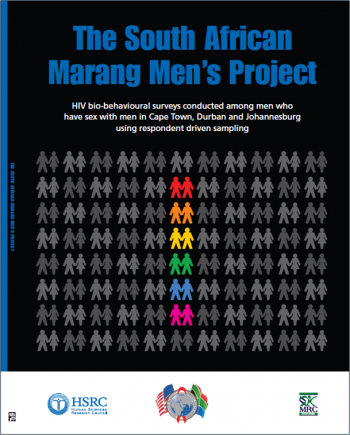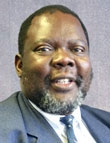Three cities study: high levels of HIV infection found among men who have sex with men
DATE: 11 November 2014
Relative to national estimates, HIV prevalence is high among men who have sex with men (MSM) in the three largest cities of South Africa. In Cape Town, the overall prevalence among MSM recruited into the study was 22.3%, in Johannesburg it was 26.8%. In Durban, the prevalence was unusually high among respondents, namely 48.2%. In each city, HIV prevalence was higher among MSM aged 25 years and older than among MSM in the 18–24 years age category - Cape Town: 27.8% versus (vs) 13.1%; Johannesburg, 36.7% vs. 17.1%; Durban, 71.1% vs. 39.3%, all respectively.
The results of a study by the Human Sciences Research Council (HSRC), called the Marang Men’s Project, was released today [11 November 2014]. The research was conducted from 2012 to 2013 among 925 MSM.
This study was funded by PEPFAR through the US Centers for Disease Control (CDC).
“This is a very crucial study on key populations – those populations with HIV prevalence above the national average – using the same methodology in all three cities. The study confirms that MSM face a higher risk for HIV infections. The findings provide much needed information to guide relevant policy development which may ultimately improve uptake of services among MSM”, says Professor Thomas Rehle, one of the principal investigators of the study.
Risky behaviour
Unprotected anal intercourse (barebacking) puts MSM at increased risk of HIV infection. It is encouraging that in the Marang Men’s Project, condom use at last sex with a male partner was found to be more than 80.0%.
Concerning self-reported sex with women, (vaginal sex) 28.4% of respondents in Cape Town and 23.0% in Johannesburg reported having engaged in vaginal sex in the last six months, with 8.0% of MSM reporting the same in Durban.
The Marang Men’s Project found that in each of the three cities, more than half of all respondents reported that they had sex with three or more male partners in the last six months.
Concerning regular sex partnerships, more than 60.0% reported having a regular male partner in the last six months in each of the three study cities. In comparison, 16.0% of respondents in Cape Town, 2.8% in Durban and 38.7% in Johannesburg reported having a regular female sex partner in the last six months.
Engaging in either selling or buying sex (transactional sex) is a risk for HIV infection, especially when condoms are not used correctly and consistently during sex. Over half of the respondents (52.6%)in Cape Town, 11.4% in Durban and 23.1% in Johannesburg reported that they had ‘sold sex to men’ in the last six months.
The association between alcohol use before sex and HIV infection has been highlighted by various studies conducted among men and women in the general population. In this study, a few of the respondents (7.0%–16.0%) in each of the three study cities reported ‘always’ engaging in sexual intercourse after consuming alcohol.
Professor Leickness Simbayi, the other principal investigator of the study, said that: “Despite some clear-cut social and cultural differences among MSM sampled in the three study cities, similarities were apparent across the cities in the project regarding HIV risk behaviours of MSM. This should be taken into consideration when developing a national HIV prevention programme for MSM”.
Use of health care services
More than 80% of respondents in each of the three cities reported that they have been tested for HIV, and most respondents said they have been tested for HIV in the last 12 months (Cape Town: 71.7%, Durban: 72.3% and Johannesburg: 61.0%). These most recent tests were done at gay-friendly health centres, followed by public hospitals. In Durban, in contrast to the other study cities, almost a quarter of the respondents (23.8%) indicated that their most recent HIV test had been done by a traditional healer.
Allanise Cloete, the project director of the Marang Men’s Project, said: “Previous research has shown that public health-care services in South Africa are generally not welcoming of MSM. Indeed, our results reveal that MSM in all three study cities prefer testing for HIV at gay-friendly health centres as opposed to public health-care facilities. These findings call for installing greater sensitivity in health-care workers to be non-judgmental in providing HIV prevention services to MSM”.
Experiences of police discrimination due to sexual orientation
South African legislation guarantees the right to sexual choice but often the very structures that are in place to protect those rights instil fear and mistrust among those who are socially marginalised. The Marang Men’s Project found unusually high estimates of police discrimination due to sexual orientation among respondents in Cape Town with 37.1% reporting police discrimination while 26.2% and 20.8% of respondents in Durban and Johannesburg, respectively, reported the same.
Previous incarceration
HIV is rampant in prisons because of the cramped single-sex living conditions as well as prolonged periods of being locked up in overcrowded cells which are believed to promote casual or forced same sex sexual relations among men mostly involving anal sex.
Previous incarceration among MSM differed in each of the three study cities with it being highest among respondents in Cape Town (67.8%), followed by Johannesburg (42.6%) and lowest in Durban (8.7%).
Recommendations
Although there might be some differences in the social and structural contexts of MSM in the three cities where the Marang Men’s Project was implemented the researchers believe that the project provided valuable data and recommendations to inform the national HIV research and service implementation agenda for MSM.
Recommendations include a comprehensive national combination HIV prevention programme for MSM that would entail targeted HIV prevention, care, treatment and counselling services for this key population; MSM-friendly health-care services should be mainstreamed into public health care systems; addressing issues of the persistence of discrimination within police and other structures that are supposed to protect human rights; more comprehensive service provision for key populations, such as male prison populations; and mainstreaming HIV prevention messaging to address not only HIV prevention for gay-identified MSM but also for men who do not necessarily identify themselves as openly gay but also engage in MSM behaviour; and there is a need to implement a national HIV bio-behavioural surveillance programme for MSM.
Concludes Professor Simbayi: “The survey provides valuable information to the South African National AIDS Council (SANAC), the national and provincial Departments of Health, and lesbian, gay, bisexual, transgender and intersex (LGBTI) organisations to both advocate for and implement improved evidence-based programmes for the health of MSM in the country.”
Note to news editors:
The full study is available at: http://www.hsrc.ac.za/en/research-outputs/view/7137
For further information and interviews, please contact
Ina van der Linde, tel 012 3022024, cell: 0823310614, e-mail: ivdlinde@hsrc.ac.za




